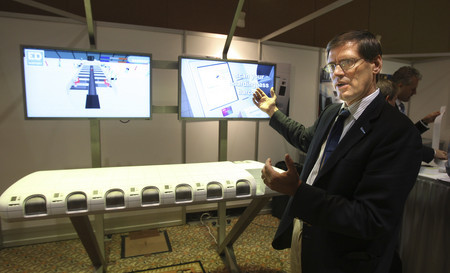No check-in flying? Believe it
If you thought the airline industry only thinks about new fees it can add to sweeten its bottom line, think again.
It also is paying a lot of attention to how it can make flying as much of a do-it-yourself operation as possible.
One of the latest ways the industry is doing that will be on display when McCarran International Airport's new $1.8 billion Terminal 3 project is completed in 2012 with high-tech turnstiles at all 14 gates in the terminal.
The terminal will be the first in the United States to employ turnstiles that will allow passengers to run bar-coded boarding passes through a reader on one side to gain access to the jetway leading to their planes.
The turnstiles, formally called automatic gates for self-service boarding, may not get people in their seats any faster than the current system of handing a paper boarding pass to a gate agent to scan, said Samuel Ingalls, McCarran's assistant director of aviation for information systems. "But it will allow the gate agents to take care of other issues, such as special seating needs," he said.
The self-service gates will cost about $20,000 and each will come equipped with a variety of sensors to prevent passengers from hurdling the gate or sneaking in two people on one ticket.
The system was one of the do-it-yourself technologies on display Friday at the Check-In '09 industry conference at Mandalay Bay. The conference focuses on technology designed to steer passengers through airports with a minimum of contact with airline or airport personnel.
There were no real breakthrough technologies unveiled at the conference Friday -- star attractions such as boarding passes on cell phone screens and self-tag baggage stands have been around for several years. But attendees focused on offerings to help coax carriers, airports and passengers to tap into technology that already exists.
For example, British discount carrier easyJet laid out its vision of assembling technologies in a package that will eliminate the need for staffed check-in counters, a pillar of airline travel since the days of Charles Lindbergh. Others pushed the concept of airports employing one baggage check-in center to cover the entire airport.
"What we are really seeing is a holistic move to self-service," Ingalls said.
Though a lot of the technology already exists, change often moves slowly with airlines despite some of the merits of the new systems, participants said.
Passengers leaving McCarran, for instance, may notice a bump in their baggage tags the size of a grain of sand. That is radio frequency identification, or RFID, an electronic chip that signals automated readers to direct a suitcase to the correct plane.
Ingalls said RFID technology has reduced operating costs and the error rate of misdirected luggage to about 1 percent, at least 10 points better than the error rate with standard optical bar-code readers. Yet five years after its installation, McCarran is still the only domestic airport using RFIDs.
"There are a lot of stakeholders involved when you implement a new process," said Jared Miller, senior director of self-service marketing programs for Continental Airlines. "You have to work with other airlines, customers, airports and security agencies."
Many of them already have significant investments in other types of technology or hardware, he noted.
In late 2007, Continental rolled out a cell phone boarding pass system that allows passengers to display on their phones a ticket with a specially designed square bar code that can be scanned at the security gates and at the boarding gate.
Nearly two years later, Miller estimates that only about 4 percent of its passengers use the mobile boarding pass, partly because the readers have been installed at only 28 of the 133 U.S. airports Continental serves. However, he added, 18 of the airports have come on line in the last three months, pointing to a quickening adoption pace.
At McCarran, the mobile phone readers have been installed at the security gateway for Concourse D, where Continental, American, Delta and Northwest all accept the mobile passes. But nothing has yet been put in place for the other three concourses, dominated by US Airways and Southwest.
Attempts to streamline baggage handling have moved even more slowly. Several years ago, McCarran started working with hotels to check in bags before they ever reached the airport. Ingalls said airport officials are still trying to reach a target of having 10 percent of passengers' bags handled off-site.
Contact reporter Tim O'Reiley at toreiley@lvbusinesspress.com or 702-387-5290.


















